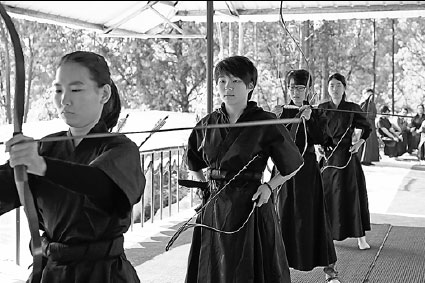Liberal arts helps university stand apart
|
Students at United International College learn Chinese archery in an elective class. Provided To China Daily |
Editor's Note: China Daily is publishing a series of reports on universities jointly established by education institutions from China and overseas. As the colleges get busy with recruitment, our reporters visited them to talk with principals, teachers and students.
Its liberal arts model of education distinguishes United International College from mainland universities and other foreign cooperative universities, according to UIC president Ng Ching-fai.
"UIC emphasizes 'Whole Person Education' through the liberal arts model," Ng said.
"By that we mean the students are expected to study not only their majors but also have the opportunity to be exposed to a wide range of knowledge."
Ng Ching-fai, former president of Hong Kong Baptist University, aimed to introduce liberal arts education to the mainland's higher education system when he helped establish UIC in Zhuhai, Guangdong province, with Beijing Normal University.
It was the first higher education institution established by a mainland university and a Hong Kong university.
UIC started its first academic year in 2005 with 274 students and has grown to 5,150 students.
The past 11 years has seen many innovative moves by UIC.
The lectures are all in English, as is the college's admission test. Students who rank below par in the national college entrance examination can still have a chance with a good performance on the UIC admission test and a good high school transcript.
The new enrollment system applies to high school graduates from Guangdong province, who take up about 40 percent of UIC's annual enrollment.
"We don't want to cultivate super scholars," he added. "We feel that education is not just classroom teaching or just learning a particular discipline. Students should go in all directions and eventually become useful to society, or what we call a 'servant leader'."
To broaden their knowledge, UIC students are required to earn half their credits through liberal studies and elective courses. The school has provided many courses to enhance team spirit and deepen students' understanding of traditional Chinese culture and arts.
For example, students can learn to play the guqin - a seven-stringed plucked instrument used in ancient times - as well as shadow puppetry and Chinese archery, all of which are special courses rarely seen in other universities.
To cultivate servant leaders, the school requires students to do volunteer work to get credit, and they are encouraged to participate in social events on and off campus - joining a club or even starting their own businesses.
"The increasing number of Sino-foreign cooperative universities shows that the value of such higher education has been recognized," Ng said.
"By drawing wisdom in higher education from Hong Kong, the UK, the US and Russia, Sino-foreign cooperative universities can diversify China's higher education models and help reform the system."
"Our education system shouldn't offer only one type of university. We should have ones that emphasize scientific research as well as those focusing on liberal arts education and those providing vocational training," he said.
"It is important to provide diverse options for young people to choose the fittest education model to give full play to their potential."
About United International College
Beijing Normal University and Hong Kong Baptist University jointly founded United International College in Zhuhai, Guangdong province, in 2005.
UIC graduates will receive bachelor's degrees of Hong Kong Baptist University and graduation certificates of United International College.
Teaching staff comes from more than 30 countries and regions, which makes it possible for UIC to use English as the language of instruction.
Every year, more than half of UIC graduates opt for postgraduate studies in Hong Kong and abroad.
UIC now has 5,150 undergraduates, 10 of whom are from overseas. It enrolls about 1,500 students on average every year and will slightly expand enrollment this year and next year to raise the number of undergraduates to 6,000.
The college is also waiting for government approval to launch a postgraduate program. It expects to enroll 1,000 postgraduates.
The construction of an additional 20-hectare campus will be completed in August or September, 2017.
xujingxi@chinadaily.com.cn



 Print
Print Mail
Mail


